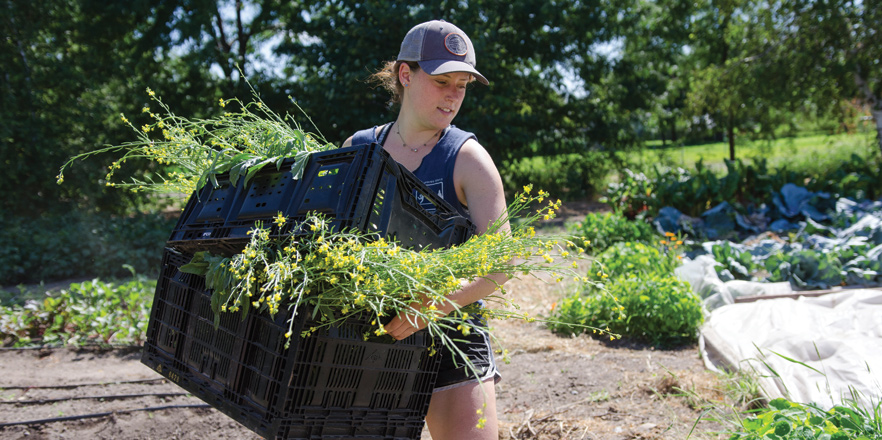The Glean Team

Photo by Matt Banderas.
Gleaning: gathering leftover fruit and vegetables from farmers’ fields that have already been commercially harvested.
Whitman’s Glean Team has existed for less than two years yet its impact is so strong it’s already part of Walla Walla’s social fabric.
Created by Samuel Curtis ’16 from Corvallis, Oregon, the student-run group is responsible for nearly 35,000 of the 59,000 pounds of food produce gleaned in Walla Walla during 2014.
Volunteers from Whitman and Walla Walla collect the food, primarily consisting of unwanted or excess crops from local farms, gardens and growers. Gleaned produce is then donated to the Blue Mountain Action Council’s Food Warehouse, which distributes it to local food banks.
Curtis was inspired by a SCORE—Summer Community OutReach Excursions—trip he ran as a first year, which focused on food and hunger.
“[Sam] realized how cool an opportunity gleaning was, and how more students could be doing it not just on SCOREs but during the school year as well,” said Caity Varian ’17, a glean team member who double majors in sociology and environmental studies.
Although he was too late to register for that year’s Student Activities Fair, an undeterred Curtis Sharpied “Whitman Glean Team” on a poster board and went canvassing anyway. He ended up with 150 email addresses and went home to start cold-calling local farms.
Over the next year, the group grew, filling a void left by the recent departure of BMAC’s gleaning coordinator.
“Whitman students jumped on board and decided to take the wheel,” said Emma Jones ’17, a biology-environmental studies major. “One of our goals is to make sure that [BMAC is] not spending too much of their time and effort doing the job that we’re trying to take over.”
For Curtis, “this has been a very meaningful and rewarding way to engage in service that extends past the Whitman community.”
Gleaning has taken them all over the city and even across state lines: from local farms and farmers’ markets to apple orchards in Milton-Freewater; from vineyards in Walla Walla to overladen fruit trees in locals’ gardens.
In 2014, Curtis received the Ben Rabinowitz Student Driven Award, an endowment that supports student-led projects that promote compassion through medical or political work. The team used much of the funding to create a short documentary (produced by film and media studies major Meg Logue ’16), which aims to promote the work they do.
What the film makes clear is how eager the students are to engage in their community.
“We all come to it from very different places,” said Jones, who plans to pursue hunger-related nonprofit work after graduation. “Food, agriculture and gardening have always been a really big part of my life.”
Others, like economics-environmental studies major Natalie Lyons-Cohen ’16, have previous experience, like working at “a food and social justice farm.”
A few of the club leaders are staying in Walla Walla this summer to oversee the glean team’s work.
“Something that’s really cool about gleaning is that it’s not specific to location,” Lyons-Cohen said. “You don’t have to be in a mainly agricultural community—you can be in San Francisco, New York. It can happen anywhere.”
To join or find out more, email whitmanglean@gmail.com.